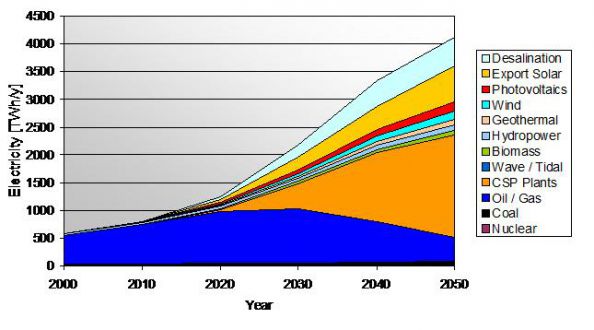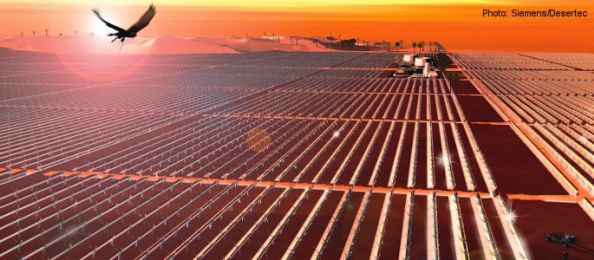Renewable Energy in the Middle East and North Africa
Until very recently, the countries of the Middle East and North Africa (MENA) region had not indicated any serious interests in the use of renewable energies, as these technologies were considered insufficient, irrelevant, and expensive. Countries with oil or gas became rich by exploiting their fossil fuel reserves, while the other countries claimed to be too poor to be able to afford wind or solar power. This picture changed dramatically in 2008 when the price of a barrel of oil climbed to $140. Suddenly, poor countries noticed they were, in fact, too poor to continue with business as usual, and the oil and gas countries noticed they were burning money by providing their own energy in conventional ways. As a consequence, countries like the United Arab Emirates founded the Masdar initiative for the promotion of renewable energy, and Morocco started a national program for wind, photovoltaic, and concentrating solar thermal power plants on a large scale. However, as in the MENA region, the main question is how to finance such a transition.
The technical options and potential for renewable energy in the MENA region are outstanding. In addition, all technologies needed for the generation and transfer of power are state of the art, including export over long distances to Europe. From 1 sq km of desert land, up to 250 million kWh of solar electricity can be harvested per year using, for example, linear Fresnel concentrating solar thermal collector systems installed at the best sites in the region. Not only the geographic distribution of renewable energy, but also the time pattern of energy availability differs from one resource to the other. Power plants utilizing wind and photovoltaic power, river-runoff hydropower, and wave and tidal power deliver electricity with highly fluctuating time patterns. With growing shares of renewable electricity in the energy mix, there is a growing challenge of integrating this type of fluctuating power into the supply system, as power must always be delivered right on demand. Other renewable sources are more easily stored, like biomass, geothermal power, hydropower from dams, and
concentrating solar thermal power.
A reasonable strategy for sustainability in the power sector is, therefore, to establish a wellbalanced mix of renewable energy sources in order to deliver power on demand at any time with as little fluctuation as possible. Within a reasonable range of capacities, pump storage and distribution of electricity within the grid can help to further balance power supply. In that case, the consumption of stored fossil fuels can be reduced to a point where they are used exclusively for backup reserves and balancing power, while the bulk of electricity will be generated by renewable sources.
Such a strategy may lead to energy sustainability in the MENA region, but at present the rapidly expanding consumer base in the region is using almost exclusively oil and gas for power generation. Looking into the medium- and long-term future, this must change significantly in favor of major shares being generating from renewable energy – not only for environmental reasons but also for socio-economic and political reasons. A business-as-usual strategy based on fossil fuels would lead to sharply increased competition and potentially serious conflicts between the countries north and south of the Mediterranean. Alternatively, the scenario outlined in the graphic creates excellent business opportunities for the MENA power sector: The realization of electricity exports from the MENA region to Europe alone has been estimated to involve an investment of €400–600 billion up until 2050. If supply of the local electricity demand is also included, the total investment by that time in the EUMENA power sector will amount to several thousand billion euros. Seawater desalination is increasingly becoming an important energy topic in the MENA region. Already today there is a critical scarcity of potable water, with groundwater levels decreasing in some regions by up to 6 meters every year due to overexploitation. Seawater desalination is a very energy-intensive option that only makes sense if a sustainable source of energy is used. Solar energy correlates very well with the demand for seawater desalination, as it is the major cause of water scarcity and, thus, an elegant way to solve the problem.

Source: Authors
Selected activities
Mediterranean Solar Plan (MSP)
The Mediterranean Solar Plan was initiated under the scope of the “Barcelona Process: Union for the Mediterranean (UfM).” It was launched in July 2008 as one of the strategic processes for sustainable development to address the foreseeable increase of energy demand in the Euro-Mediterranean region and the need to reduce greenhouse gas emissions. Its main objective is to develop an installed capacity of 20 GW of renewable power on the south shore of the Mediterranean, as well as the necessary infrastructures for an electricity interconnection with Europe.
DESERTEC
- The DESERTEC concept is based on the use of desert areas to harvest renewable energy like solar and wind power where it is most abundantly available. In order to accelerate the construction of the required facilities and infrastructure, the Desertec Foundation (DF) and its industrial initiative, Dii GmbH, both established in 2009, are working on the development of appropriate policy frameworks that will allow for international trade with clean power and provide suitable investment incentives in the MENA region. The long-term goal is to provide a considerable share of the power generation from renewable sources in the MENA region and about 100 GW of solar energy exports from the MENA region to Europe by 2050.
MedGrid
- Whereas Dii GmbH is focusing on the entire value-adding chain of power generation, transmission, and power markets and working on a long-term roll-out plan to be implemented by 2050, the French MedGrid industry initiative is concentrating on establishing power transmission infrastructure and framework conditions in the Mediterranean region by 2020 within the framework of the Mediterranean Solar Plan (MSP). The industry initiatives Dii GmbH and MedGrid plan to work in close cooperation with each other.
European initiatives
- In its renewable energy directive from 2010, the European Commission established concrete goals of renewable energy shares in Europe to be implemented by 2020 and lists the different renewable energy technologies that are candidates for European supply. A recent communication from Catherine Ashton, the High Representative of the European Commission for Foreign Affairs, proposed “a partnership for democracy and shared prosperity with the Southern Mediterranean” to the European Parliament, the Council, and the Committee, in which she proposes to establish in the long-run an “EU-South Mediterranean Energy Community.”
National MENA initiatives
- Egypt and Morocco have already initiated renewable energy development processes in the form of wind parks, although on a very modest scale compared to the activities in this sector in Europe. The United Arab Emirates has founded the company Masdar for the deployment of sustainable forms of energy. Under the supervision of the Moroccan Agency for Solar Energy, Morocco has started to develop power plants with a projected capacity of 2,000 MW deriving from wind, photovoltaic, and solar thermal power.
Dr. Franz Trieb is Project Manager at the German Aerospace Center (DLR).
Prof. Dr. Hans Müller-Steinhagen is Rector at Technische Univerität Dresden.
About Us // Privacy Policy // Copyright Information // Legal Disclaimer // Contact
Copyright © 2012-2018 macondo publishing GmbH. All rights reserved.
The CSR Academy is an independent learning platform of the macondo publishing group.









